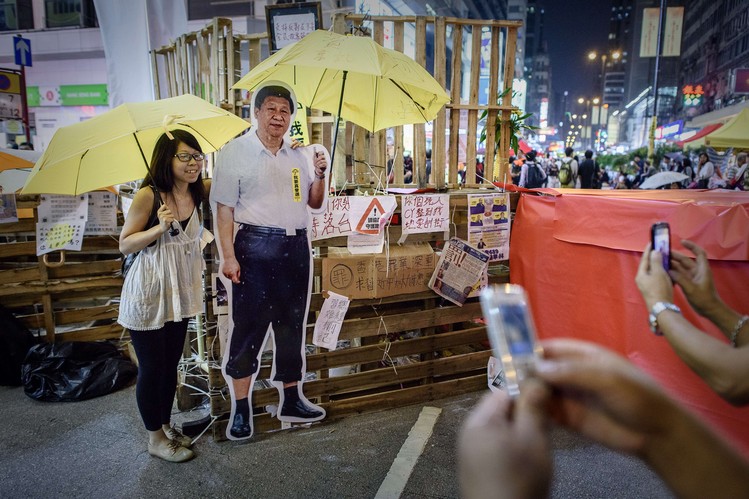nimo_cn
Senior Member
- Joined
- Aug 18, 2009
- Messages
- 4,032
- Likes
- 883
http://www.telesurtv.net/english/ne...s-Linked-to-US-Government--20141002-0011.html
Wikileaks: HK Protests Linked to US Government
Previous cables show links between United States agencies and the Hong Kong protest movement, as Beijing warns that the protests are China's "internal affairs."
The United States funded groups linked to the ongoing Occupy Central protests in Hong Kong, according to whistleblowing website Wikileaks.
The website tweeted that key figures behind the demonstrations are linked to the National Endowment for Democracy (NED), a U.S. foundation "dedicated to the growth and strengthening of democratic institutions around the world," according to its website, but which has been linked with coup attempts and "regime change" plans in Venezuela and elsewhere.
US State Department/NED funded Hong Kong protest movement "Occupy Central" http://t.co/TFvob8Ragf
— WikiLeaks (@wikileaks) octubre 2, 2014
The Occupy Central movement erupted in Hong Kong last weekend, with organizers stating that over 80,000 people turned out to protest against Beijing's "white paper" on eligibility criteria for standing for election to ruling positions in 2017.
A Wikileaks cable released September 4, 2008 from the American Consulate in Hong Kong to the Secretary of State offices of Condelezza Rice, refers to a US State Department funded project, The Hong Kong Transition Project.
Whilst a cable dated July 2, 2009 discusses demonstration turnouts and how to make them more successful in the future. Whilst a 4 Jan 2010 cable from the American Consulate in Hong Kong to the offices of the Secretary of State looks at increasing the effectiveness of political messaging on future demonstrations.
The revelations come as China has warned that foreign meddling in its affairs will not be tolerated. "Hong Kong is ... a special administrative region of China, and Hong Kong affairs are completely China's internal affairs," Foreign Ministry spokesperson Hua Chunying stated.
The spokesperson stated the Chinese government is "resolutely opposed to any country attempting in any way to support such illegal activities like 'Occupy Central'."
﹉﹉﹉﹉﹉﹉﹉﹉
the so called occupy central movement has been manipulated by the American government since the very beginning.
HK has been deeply infiltrated by western agents, time to clean them off.
Sent from my HUAWEI P7-L07 using Tapatalk 2
Wikileaks: HK Protests Linked to US Government
Previous cables show links between United States agencies and the Hong Kong protest movement, as Beijing warns that the protests are China's "internal affairs."
The United States funded groups linked to the ongoing Occupy Central protests in Hong Kong, according to whistleblowing website Wikileaks.
The website tweeted that key figures behind the demonstrations are linked to the National Endowment for Democracy (NED), a U.S. foundation "dedicated to the growth and strengthening of democratic institutions around the world," according to its website, but which has been linked with coup attempts and "regime change" plans in Venezuela and elsewhere.
US State Department/NED funded Hong Kong protest movement "Occupy Central" http://t.co/TFvob8Ragf
— WikiLeaks (@wikileaks) octubre 2, 2014
The Occupy Central movement erupted in Hong Kong last weekend, with organizers stating that over 80,000 people turned out to protest against Beijing's "white paper" on eligibility criteria for standing for election to ruling positions in 2017.
A Wikileaks cable released September 4, 2008 from the American Consulate in Hong Kong to the Secretary of State offices of Condelezza Rice, refers to a US State Department funded project, The Hong Kong Transition Project.
Whilst a cable dated July 2, 2009 discusses demonstration turnouts and how to make them more successful in the future. Whilst a 4 Jan 2010 cable from the American Consulate in Hong Kong to the offices of the Secretary of State looks at increasing the effectiveness of political messaging on future demonstrations.
The revelations come as China has warned that foreign meddling in its affairs will not be tolerated. "Hong Kong is ... a special administrative region of China, and Hong Kong affairs are completely China's internal affairs," Foreign Ministry spokesperson Hua Chunying stated.
The spokesperson stated the Chinese government is "resolutely opposed to any country attempting in any way to support such illegal activities like 'Occupy Central'."
﹉﹉﹉﹉﹉﹉﹉﹉
the so called occupy central movement has been manipulated by the American government since the very beginning.
HK has been deeply infiltrated by western agents, time to clean them off.
Sent from my HUAWEI P7-L07 using Tapatalk 2









